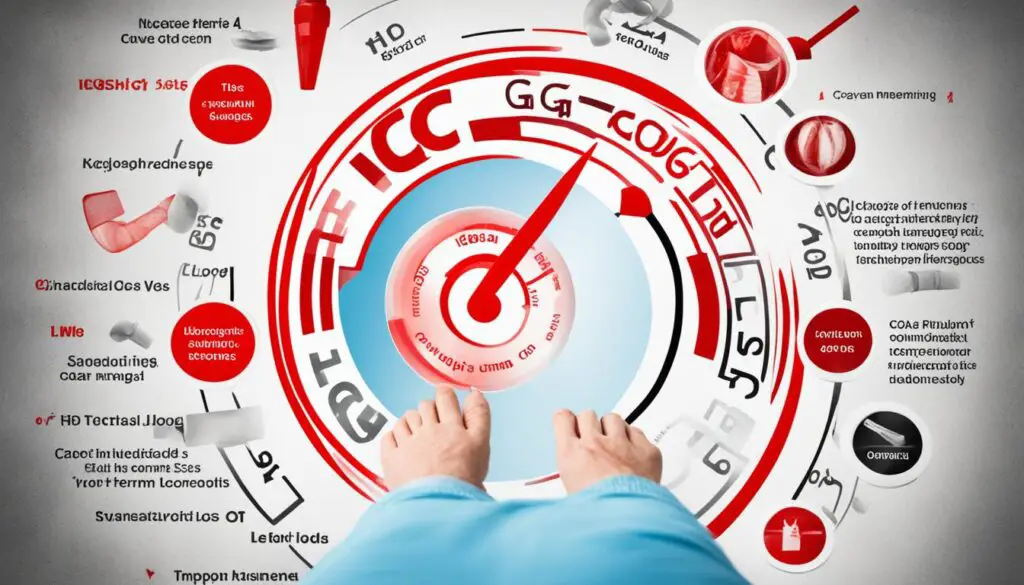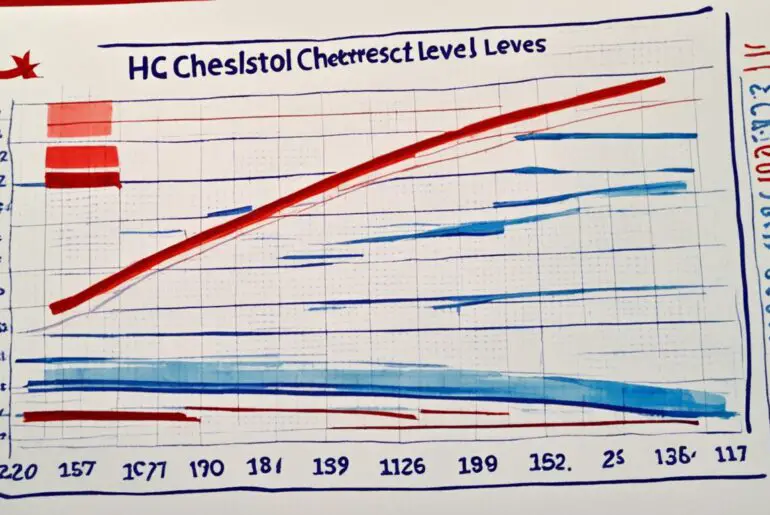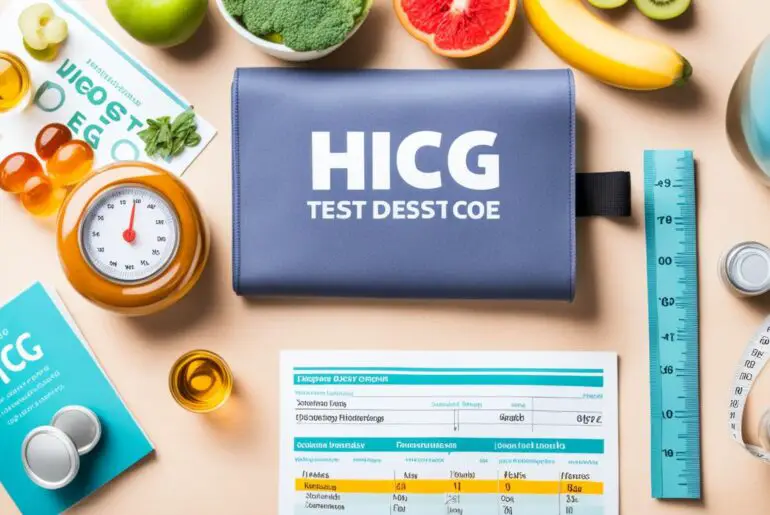Are you considering the HCG diet for long-term weight loss? Think again. While the HCG diet has gained popularity for its promise of rapid weight loss, there are potential risks and safety concerns associated with this extreme approach. Let’s explore the dangers of long-term HCG dieting and why safer alternatives should be considered.
Key Takeaways:
- The HCG diet involves severe calorie restriction and is deemed unsafe and ineffective by the FDA.
- Prolonged HCG dieting can lead to risks such as gallstone formation, irregular heartbeat, nutrient deficiencies, and fatigue.
- There is a lack of scientific evidence supporting the efficacy of the HCG diet.
- The use of homeopathic HCG products and scams should be avoided.
- Safer alternatives for weight loss include balanced nutrition, regular exercise, and long-term lifestyle changes.
The History of the HCG Diet
The HCG diet, with its intriguing claims of rapid weight loss, has a history dating back to the early 1950s. It was British physician Albert Simeons who first popularized this method as a way to shed excess pounds.
Simeons touted the HCG diet as a revolutionary approach that could specifically target stored body fat without causing muscle loss. According to his claims, the HCG hormone, which is produced during pregnancy, could unlock fat stores and assist in burning them off, leading to rapid weight loss.
However, despite the initial hype surrounding the HCG diet, scientific evidence over the years has failed to support its claims. The Food and Drug Administration (FDA) does not approve the use of HCG for weight loss due to the lack of scientific evidence supporting its efficacy.
Although there are numerous testimonials from individuals who have experienced rapid weight loss on the HCG diet, it’s important to note that these testimonials are not scientifically proven and may not be representative of the overall population.
Origin of the HCG Diet
The origins of the HCG diet can be traced back to Albert Simeons’ work in the 1950s. During his research, Simeons discovered that pregnant women who were experiencing severe calorie restriction due to illness seemed to retain a healthier pregnancy and give birth to normal-weight babies. This observation formed the basis of his theory that HCG could mobilize stored fat and provide essential nutrients for both the mother and the fetus.
“The diet must be followed exactly as outlined by Dr. Simeons.
The fat must not be visible, especially in thick areas… Do not omit anything. Do not guess portions… It is important to keep in mind that without HCG medications, the diet will not work and you may damage yourself.”
Although the HCG diet gained popularity, especially for its rapid weight loss results, it is essential to critically evaluate the validity of these claims. The scientific community has not been able to replicate the supposed fat-burning and muscle-preserving effects of HCG as described by Simeons.
Exploring HCG Diet Claims and Testimonials
The HCG diet has attracted significant attention and countless testimonials from individuals who claim to have achieved exceptional weight loss results. These testimonials often highlight the rapidity of the weight loss and the ability to lose fat in specific problem areas, such as the abdomen or thighs.
While these personal accounts may be persuasive, it is crucial to note that the scientific evidence supporting the effectiveness of the HCG diet is lacking. The testimonials may reflect individual experiences, but they do not provide substantial evidence to support the overall claims of the diet’s effectiveness.
Moreover, the FDA, in its evaluation of the HCG diet, has explicitly stated that the use of HCG for weight loss is unsupported by scientific evidence and is considered unsafe and illegal when marketed for such purposes.
| Claims of the HCG Diet | Scientific Evidence |
|---|---|
| Rapid weight loss | Limited evidence, primarily due to severe calorie restriction |
| Targeted loss of fat without muscle loss | No scientific evidence supporting this claim |
| Regulating hunger and cravings | No scientific evidence supporting this claim |
| Boosting metabolism | No scientific evidence supporting this claim |
| Safe and effective weight loss method | FDA does not approve the use of HCG for weight loss |
While the HCG diet may offer temporary weight loss results for some individuals, it is important to approach the claims and testimonials associated with this diet with caution. Making informed decisions about weight loss methods requires an understanding of the scientific evidence and the guidance of healthcare professionals.
The HCG Diet and Calorie Restriction

The HCG diet is characterized by severe calorie restriction, with individuals consuming only 500 to 800 calories per day. This drastic reduction in calorie intake leads to rapid weight loss in the short term.
The HCG diet meal plan typically comprises two meals per day, usually lunch and dinner. These meals consist of lean protein sources, specific low-carbohydrate vegetables, limited quantities of fruits, and minimal fats. By adhering to this strict meal plan, individuals aim to achieve their weight loss goals.
Effects of Severe Calorie Restriction
Severe calorie restriction on the HCG diet can result in nutrient deficiencies due to the limited variety and quantity of food consumed. Vitamins, minerals, and other essential nutrients may not be adequately obtained, leading to potential health risks.
Moreover, very low-calorie intake can impact energy levels and mental well-being. Fatigue, irritability, and difficulty concentrating are some of the side effects that individuals may experience. These challenges can make adhering to the diet plan difficult and affect overall quality of life during the dieting phase.
“The main component of the HCG diet is severe calorie restriction, with daily intake limited to only 500 to 800 calories.”
It is essential to emphasize that such a restrictive diet should be carefully monitored by a healthcare professional, as it may not be suitable for everyone. Each individual’s nutritional needs and health conditions should be taken into account.
| Advantages of the HCG Diet Calorie Restriction | Disadvantages of the HCG Diet Calorie Restriction |
|---|---|
|
|
While the HCG diet’s severe calorie restriction may produce rapid weight loss in the short term, it is crucial to consider the potential risks and drawbacks associated with this approach. Adequate nutrition and overall well-being should always be prioritized when embarking on any weight loss journey.
Efficacy of the HCG Diet
When it comes to the effectiveness of the HCG diet, scientific evidence is lacking. Multiple studies have been conducted to evaluate the efficacy of the HCG diet, and the results have been consistent in challenging its claims.
These studies compared the effects of HCG and placebo injections given to individuals on a calorie-restricted diet. Surprisingly, there were no significant differences in weight loss between the two groups, indicating that the weight loss achieved on the HCG diet is primarily due to the drastic calorie restriction rather than the HCG hormone itself.
The HCG hormone, which is produced during pregnancy, has not been proven to reduce hunger or promote fat loss. Therefore, the idea that the HCG diet can lead to significant weight loss through the hormone’s effects remains unsupported by scientific research.
In light of the lack of scientific evidence supporting the efficacy of the HCG diet, it is crucial to approach this diet with caution and skepticism. It is important to consider alternative weight loss methods that have a stronger foundation of scientific support and safety.
Table:
| Study | Findings |
|---|---|
| Study 1 | No significant difference in weight loss between HCG and placebo groups |
| Study 2 | Calorie restriction, rather than HCG hormone, responsible for weight loss |
| Study 3 | No evidence of HCG hormone reducing hunger or promoting fat loss |
Quotes:
“The weight loss achieved on the HCG diet is primarily due to the drastic calorie restriction and not the HCG hormone itself.” – Study 2
“There is no scientific evidence to support the claim that the HCG hormone reduces hunger or promotes fat loss.” – Study 3
With the lack of scientific evidence and mixed findings from studies, it is essential to approach the HCG diet with caution and prioritize evidence-based weight loss approaches.
Safety Concerns of the HCG Diet

The HCG diet is not without its safety concerns and potential side effects. It’s essential to be aware of these risks before considering the HCG diet for weight loss. Some of the safety concerns associated with the HCG diet include:
- Fatigue: Due to the severe calorie restriction, individuals on the HCG diet may experience significant fatigue and lack of energy.
- Irritability and Restlessness: The very low-calorie intake can lead to mood changes, irritability, and restlessness.
- Depression: The restrictive nature of the HCG diet may contribute to feelings of depression and emotional distress.
- Fluid Buildup: Some individuals may experience fluid buildup or edema while on the HCG diet.
- Swelling of the Breasts in Males: In some cases, the HCG diet can lead to gynecomastia, which is the swelling of breast tissue in males.
- Blood Clot Formation: There is a serious concern of blood clot formation, which can lead to potentially life-threatening complications.
- Nutrient Deficiencies: The low-calorie intake on the HCG diet can result in nutrient deficiencies, including vitamins, minerals, and essential fatty acids.
- Gallstone Formation: Rapid weight loss and the absence of dietary fats can increase the risk of gallstone formation.
- Irregular Heartbeat: The HCG hormone may cause irregular heartbeat or cardiac arrhythmias.
- Electrolyte Imbalances: Severe calorie restriction can disrupt electrolyte balance, leading to health issues.
It is important to note that the use of HCG products for weight loss is considered illegal and dangerous by the Food and Drug Administration (FDA). Over-the-counter HCG products are required to carry a label from the FDA stating that they are not effective for weight loss. Consulting with a healthcare professional is highly recommended before starting any weight loss program, especially one as restrictive as the HCG diet.
The Effect of the HCG Diet on Body Composition
The HCG diet claims to preserve muscle mass and boost metabolism while promoting fat loss. However, there is no scientific evidence to support these claims. Very low-calorie diets, like the HCG diet, can actually lead to muscle loss and a decrease in metabolism. The restrictive nature of the HCG diet can also result in a preoccupation with food, food cravings, and potentially disordered eating behaviors.
The HCG diet’s impact on body composition has been a topic of debate. While supporters argue that it helps target fat stores while preserving muscle, there is little scientific evidence to back up these claims. In fact, extremely low-calorie diets like the HCG diet can result in muscle loss due to inadequate protein intake.
Maintaining muscle mass is crucial for overall health and metabolism. Muscles play a significant role in burning calories and maintaining a healthy body composition. When muscle mass is lost, the body’s resting metabolic rate decreases, making it even more challenging to maintain weight loss in the long run.
The HCG diet’s emphasis on severe calorie restriction can lead to loss of both fat and muscle mass, which can negatively impact body composition. While individuals may experience initial weight loss, much of it may come from water and muscle loss rather than sustained fat reduction.
The restrictive nature of the HCG diet, with its limited food choices and low calorie intake, can also lead to a heightened preoccupation with food and increased cravings. This may result in disordered eating behaviors, an unhealthy relationship with food, and potential weight regain once the diet is stopped.
| Effect of HCG Diet on Body Composition | |
|---|---|
| Muscle Loss | An extremely low-calorie diet like the HCG diet can lead to muscle loss due to inadequate protein intake. |
| Metabolism | Loss of muscle mass can decrease the body’s resting metabolic rate, making it harder to maintain weight loss. |
| Body Fat | The HCG diet may result in initial weight loss, but much of it may come from water and muscle loss rather than sustained fat reduction. |
| Disordered Eating | The restrictive nature of the HCG diet can contribute to a preoccupation with food, increased cravings, and potential disordered eating behaviors. |
While the HCG diet may appear promising in terms of rapid weight loss, it is important to consider the potential negative effects on body composition and long-term weight maintenance. Sustainable weight loss and a healthy body composition are best achieved through a balanced diet, regular exercise, and a focus on overall lifestyle changes.
Homeopathic HCG Products and Scams

When searching for HCG products, it is important to be aware of the dangers and scams associated with homeopathic HCG products. Many HCG products available on the market are labeled as homeopathic, claiming to contain HCG hormone but in reality, they do not contain any real HCG hormone at all. These products are unregulated and may even contain unknown ingredients, posing significant risks to your health.
Genuine HCG injections, on the other hand, can only be obtained through a doctor’s prescription for specific medical purposes and are not intended for weight loss. It is crucial to understand that the FDA does not approve HCG for over-the-counter use or as a weight loss treatment.
The FDA has raised concerns about the safety and efficacy of homeopathic HCG products. These unregulated and potentially harmful products should be avoided to protect your health and well-being. It is always recommended to consult with a healthcare professional before considering any weight loss regimen.
Protect yourself from HCG diet scams and make informed choices about your health and weight loss journey. Stick to proven and regulated methods for safe and effective weight loss.
HCG Diet Regulations
The use of HCG products for weight loss is considered illegal and dangerous by the FDA. All over-the-counter HCG products are required to carry a label from the FDA stating that they are not effective for weight loss. This regulation aims to protect consumers from potential harm and to ensure that they are not misled by false claims about the efficacy of homeopathic HCG products.
It is important to be aware of these regulations and avoid falling victim to HCG diet scams. Putting your trust in unregulated and potentially harmful products can have serious consequences for your health. Always prioritize your safety and consult with a healthcare professional for guidance on safe and effective weight loss strategies.
Safety Regulations and FDA Approval

The FDA regulations on the HCG diet are clear: HCG products for weight loss are illegal and dangerous. These products have not been approved by the FDA and are considered unproven and ineffective for weight loss purposes. It is important to note that serious adverse reactions have been reported with the use of HCG for weight loss, including blood clots and cardiac issues.
The FDA only approves the use of HCG with a doctor’s prescription for specific medical purposes, such as fertility treatments in certain situations. This means that using HCG as a weight loss method is not only ineffective but also potentially risky for your health.
When it comes to weight loss, it is important to choose FDA-approved methods that have been scientifically proven to be safe and effective. There are many FDA-approved weight loss methods available that can help you achieve your goals without compromising your health.
Takeaway
“The FDA regulations clearly state that HCG products for weight loss are illegal and dangerous. Choose FDA-approved weight loss methods to ensure your safety and success.”
Remember, always consult with a healthcare professional before starting any weight loss regimen to ensure that you are following a safe and appropriate plan for your individual needs.
Safer Alternatives for Weight Loss

Instead of the HCG diet, it is essential to consider safer and more sustainable alternatives for weight loss. It is crucial to focus on methods that prioritize long-term health and well-being, rather than quick-fix diets that may have potential risks and limitations.
Develop a Balanced and Nutritious Diet Plan
One of the key elements of a healthy weight loss approach is developing a balanced and nutritious diet plan. This includes incorporating a variety of fruits, vegetables, lean proteins, whole grains, and healthy fats into your meals. By providing your body with the necessary nutrients, you can ensure optimal health and support sustainable weight loss.
Engage in Regular Physical Activity
Regular physical activity is another crucial component of a safe and effective weight loss strategy. Engaging in exercise can help you burn calories, increase muscle mass, improve cardiovascular health, and enhance overall fitness. Aim for at least 150 minutes of moderate-intensity aerobic activity or 75 minutes of vigorous-intensity aerobic activity each week, along with strength training exercises twice a week to promote weight loss and maintain muscle mass.
Focus on Long-Term Lifestyle Changes
Rather than relying on temporary diets, focus on making long-term lifestyle changes that promote overall health and help you maintain a healthy weight. Sustainable weight loss is about adopting healthy habits that you can maintain for the long term. This may include mindful eating, portion control, stress management techniques, and getting enough sleep. By creating a balanced lifestyle that supports your weight loss goals, you are more likely to achieve sustainable results.
Consult with a Healthcare Professional
When embarking on a weight loss journey, it is always advisable to seek guidance from a healthcare professional, such as a doctor or registered dietitian. They can provide personalized advice and support based on your specific needs and goals. A healthcare professional can help create a tailored weight loss plan, monitor your progress, and address any concerns or challenges that may arise.
By implementing these safer weight loss methods, adopting healthy approaches, and focusing on sustainable strategies, you can achieve your weight loss goals while prioritizing your overall health and well-being.
Conclusion
The HCG diet presents numerous risks and safety concerns that individuals should consider before embarking on this weight loss regimen. One of the main dangers of the HCG diet is its severe calorie restriction, which can lead to nutrient deficiencies and potentially have adverse effects on overall health. Additionally, the efficacy of the HCG diet in achieving sustainable weight loss has not been scientifically proven.
Instead of resorting to the HCG diet, individuals should explore safer alternatives that prioritize balanced nutrition, regular exercise, and long-term lifestyle changes. These approaches provide a more sustainable path to weight loss and promote overall well-being. It is essential to consult with a healthcare professional, such as a doctor or registered dietitian, before starting any weight loss regimen to obtain personalized advice and guidance tailored to one’s specific needs.
By focusing on healthier and more sustainable weight loss strategies, individuals can achieve their goals in a safe and effective manner, without compromising their overall health and well-being. Remember, long-term success lies in making sustainable lifestyle changes rather than relying on quick-fix diets like the HCG diet. Prioritize your health and consult with a healthcare professional for the best guidance on your weight loss journey.
FAQ
What is the HCG diet?
The HCG diet is a weight loss program that involves severe calorie restriction, typically limiting daily intake to 500 to 800 calories. It also involves the use of the hormone human chorionic gonadotropin (HCG) either through injections or homeopathic products.
Is the HCG diet safe?
No, the HCG diet is not considered safe. The severe calorie restriction and use of HCG hormone can lead to various health risks, including gallstone formation, irregular heartbeat, nutrient deficiencies, electrolyte imbalances, fatigue, depression, and the risk of blood clots forming.
What does scientific evidence say about the effectiveness of the HCG diet?
Scientific evidence does not support the claims made about the effectiveness of the HCG diet. Multiple studies have found that weight loss achieved on the HCG diet is primarily due to severe calorie restriction and not the HCG hormone itself.
What are the side effects of the HCG diet?
Side effects of the HCG diet can include fatigue, irritability, restlessness, depression, fluid buildup, swelling of the breasts in males, and a serious concern of blood clot formation. The severe calorie restriction can also lead to nutrient deficiencies, gallstone formation, irregular heartbeat, and electrolyte imbalances.
Are homeopathic HCG products safe to use?
Homeopathic HCG products are unregulated and may contain unknown ingredients. The FDA has raised concerns about the safety and efficacy of these products, and they should be avoided.
Is the HCG diet FDA-approved?
No, the FDA does not approve the use of HCG for weight loss. HCG products for weight loss are considered illegal and dangerous. The only approved use of HCG, with a doctor’s prescription, is for fertility treatments in certain situations.
What are some safer alternatives for weight loss?
Safer and more sustainable alternatives for weight loss include developing a balanced and nutritious diet plan, engaging in regular physical activity, and focusing on long-term lifestyle changes rather than quick-fix diets. Consulting with a healthcare professional can provide personalized guidance and support.




